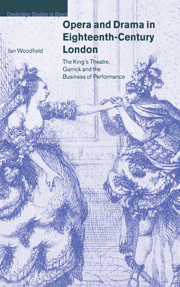 Opera and Drama in Eighteenth-Century London
Opera and Drama in Eighteenth-Century London Book contents
- Frontmatter
- Contents
- List of tables
- List of musical examples
- Acknowledgements
- A note on conventions
- Introduction
- 1 The Hobart management
- 2 The new managers take control
- 3 Sacchini and the revival of opera seria
- 4 Recruitment procedures and artistic policy
- 5 The King's Theatre in crisis
- 6 The recruitment of Lovattini
- 7 The English community in Rome
- 8 Lucrezia Agujari at the Pantheon
- 9 Caterina Gabrielli
- 10 Rauzzini's last season
- 11 The King's Theatre flourishes
- 12 The Queen of Quavers satire
- 13 Financial management
- 14 Opera salaries
- 15 The sale of 1778
- Appendices
- 1a The accounts of Richard Yates and James Brooke at Henry Hoare & Co. (1773–1777)
- 1b The customer account ledgers of Sheridan and Harris (1778–1779)
- 1c Selected entries from the account of Jonathan Garton at Drummonds Bank (1778–1779)
- 1d The account of Gasparo Pacchierotti at Coutts & Co. (1779–1784)
- 1e A page of opera payments and receipts in the Salt MSS (1780)
- 2a Petition to the Lord Chamberlain (c.1770)
- 2b Petition to the Lord Chamberlain (c.1775)
- 2c Draft petition to the Lord Chamberlain from Sheridan and Harris (1777)
- 3a Journal Etranger, No. 1 (June 1777)
- 3b Opera reviews from Journal Etranger (1777–1778)
- Notes
- Bibliography
- Index
2b - Petition to the Lord Chamberlain (c.1775)
Published online by Cambridge University Press: 22 September 2009
- Frontmatter
- Contents
- List of tables
- List of musical examples
- Acknowledgements
- A note on conventions
- Introduction
- 1 The Hobart management
- 2 The new managers take control
- 3 Sacchini and the revival of opera seria
- 4 Recruitment procedures and artistic policy
- 5 The King's Theatre in crisis
- 6 The recruitment of Lovattini
- 7 The English community in Rome
- 8 Lucrezia Agujari at the Pantheon
- 9 Caterina Gabrielli
- 10 Rauzzini's last season
- 11 The King's Theatre flourishes
- 12 The Queen of Quavers satire
- 13 Financial management
- 14 Opera salaries
- 15 The sale of 1778
- Appendices
- 1a The accounts of Richard Yates and James Brooke at Henry Hoare & Co. (1773–1777)
- 1b The customer account ledgers of Sheridan and Harris (1778–1779)
- 1c Selected entries from the account of Jonathan Garton at Drummonds Bank (1778–1779)
- 1d The account of Gasparo Pacchierotti at Coutts & Co. (1779–1784)
- 1e A page of opera payments and receipts in the Salt MSS (1780)
- 2a Petition to the Lord Chamberlain (c.1770)
- 2b Petition to the Lord Chamberlain (c.1775)
- 2c Draft petition to the Lord Chamberlain from Sheridan and Harris (1777)
- 3a Journal Etranger, No. 1 (June 1777)
- 3b Opera reviews from Journal Etranger (1777–1778)
- Notes
- Bibliography
- Index
Summary
The Managers of the Opera to the Lord Chamberlain
The managers of the Opera beg permission to solicit the Lord Chamberlains protection, and to lay before his Lordship a real state of the hardships under which they suffer.
They beg leave to represent to his Lordship that it is impossible for the Receipts of Italian Opera's only to support the necessary expences.
That the Salaries of the first Singers and Dancers being so enormous they are at a larger yearly expence than the other Theatres, and instead of six Nights in a Week have in effect only one as on the Tuesdays they constantly play to great loss.
That the Subscription Saturday Nights are only twenty five and the few nights after the Subscription scarce worth taking, as the People of fashion are out of town.
That the Kings Theatre was originally a play house under his Majestys immediate protection and that of the Lord Chamberlain and continued such till Mr Collier came into a compromise with the Managers of Drury Lane to suspend giving plays at the Opera House on condition the Managers of Drury Lane engaged not to play on Opera Nights and to allow the Directors of the Opera as a further compensation Two Hundred Pounds a Year: an Agreement which has not been fulfill'd on the side of the Patentees of the other Theatre for many years: on the contrary, they have given the strongest pieces they possibly cou'd at both houses, on Opera Nights, and given both comic and serious English Operas with Italian Music, to the great detriment of the Managers of the Opera.
- Type
- Chapter
- Information
- Opera and Drama in Eighteenth-Century LondonThe King's Theatre, Garrick and the Business of Performance, pp. 269 - 271Publisher: Cambridge University PressPrint publication year: 2001


